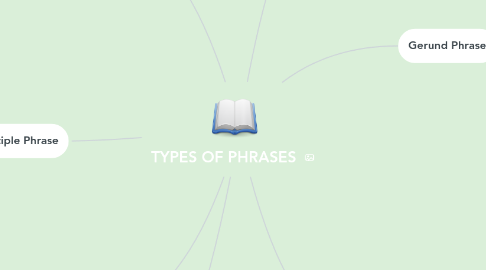
1. Appositive Phrase
1.1. Is a noun or pronoun that renames or identifies another noun or pronoun in some way. An appositive phrase consists of an appositive and its modifiers.
1.2. Essential appositive provides information that is necessary for identifying the noun or pronoun that precedes it.
1.3. Nonessential appositive provides additional information about a noun or pronoun in a sentence whose meaning is already clear.
1.4. Examples
1.4.1. Author William Shakespeare wrote over 30plays during the course of his career. (Essential Appositive)
1.4.2. Frankie, the dog that lives next door, likes to go for walks in the park. (Nonessential Appositive)
2. Participle Phrase
2.1. A participle is a verb form that functions as an adjective by modifying nouns and pronouns. A participle can be either a present participle or a past participle. A participial phrase includes the participle, plus any modifiers and complements.
2.2. Examples
2.2.1. The sobbing child held his injured knee. (Present Participle)
2.2.2. The broken window needed to get repaired quickly. (Past Participle)
3. Prepositional Phrase
3.1. A prepositional phrase is a group of words that includes a preposition and a noun. A prepositional phrase will function as either an adjective or an adverb.
3.2. Common examples of prepositions include about, after, at, before, behind, by, during, for, from, in, of, over, past, to, under, up, and with.
3.3. Examples
3.3.1. The boy with him is his son. (Prepositional Phrase functioning as Adjective Phrase)
3.3.2. When you get to the sing, take a left. (Prepositional Phrase Functioning as Adverb Phrase)
4. Adjective Phrase
4.1. An adjective phrase modifies a noun or pronoun by providing more information about it. Prepositional phrases, participial phrases, and infinitive phrases can all function as adjective phrases in sentences.
4.2. Examples
4.2.1. I have a scratch on my arm. (Prepositional Phrase)
4.2.2. We rescued the dog with the injured leg. (Prepositional Phrase)
5. Adverbial Phrase
5.1. Like an adverb, modifies a verb, an adjective, or an adverb by providing additional details about it. An adverb phrase, like an adverb, modifies a verb, an adjective, or an adverb by providing additional details about it. Prepositional phrases and infinitive phrases can both function as adverb phrases in sentences.
5.2. Examples
5.2.1. Things are going well at school (Preositional Phrase as Adverb Phrase)
5.2.2. To track my running speed, I use a stop eatch. (Infinitive phrase as Adverb Phrase)
6. Gerund Phrase
6.1. Are essentially noun phrases that begin with a gerund.
6.2. They can act as subjects, direct objects, indirect objects, predicate nominatives, or objects of a preposition in a sentence.
6.3. Examples
6.3.1. Riding a roller coaster scares my little brother. (Subject)
6.3.2. In the summer, Kara prefers swimming. (Direct Object
6.3.3. As part of his exercise regimen, Jack made walking every day a priority. (Indirect Object)
6.3.4. Micah's favorite sport is running. (Predicate Nominative).
7. Infinitive Phrase
7.1. Is a verb form that typically begins with the word to. Include any modifiers and complements,
7.2. Can function as a as nouns, adjectives, or adverbs in a sentence. As nouns, infinitives and infinitive phrases can act either as subjects, direct objects, or predicate nominatives.
7.3. Examples
7.3.1. To see the northern lights in person is incredible. (Noun as Subject)
7.3.2. Cory wants to sing. (Noun as Direct Obejct
7.3.3. Jay's greatest aspiration was to climb Mount McKinley. (Noun as a Predicate Nominative)
7.3.4. Pablo is a important person to know. (Adjective)
7.3.5. To sleep, bats hung upside down. (Adverb)
7.3.6. Thomas want to take swimming lessons. (IP) I brought my niece to the teather. (PP)
7.3.7. Splite Infinitive: I need to definitely see that movie!
